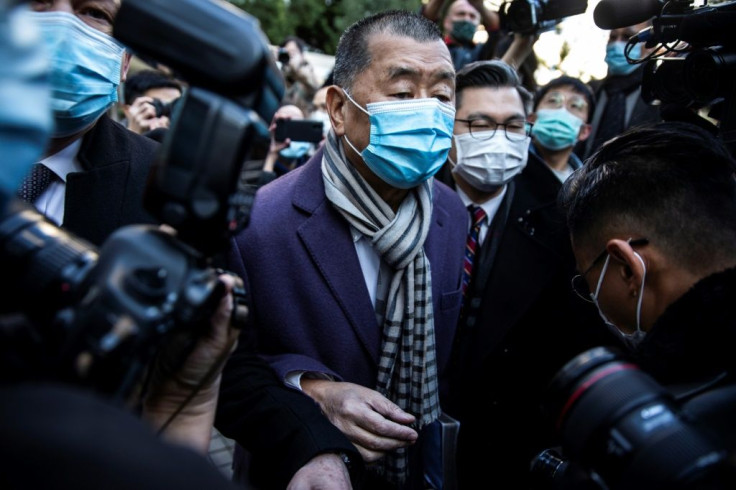Three Hong Kong Activists Plead Not Guilty Over Tiananmen Vigil Charges
Three Hong Kong activists, including media tycoon Jimmy Lai, pleaded not guilty on Monday to charges over last year's banned Tiananmen vigil.
The trio, Lai, Chow Hang-tung and Gwyneth Ho will be the only defendants to stand a full trial among more than two dozen pro-democracy politicians and activists charged over the annual commemorative event. The other defendants all pleaded guilty to charges including inciting and taking part in an illegal assembly.
"I understand every word you said but I do not understand why it constituted a crime," Chow told the court.
"Mourning is not a crime. I plead not guilty."
For three decades, Hong Kong's annual June 4 vigil commemorated the victims of Beijing's 1989 crackdown on democracy and anti-corruption rallies in Tiananmen Square.
Tens of thousands of people would crowd into Hong Kong's Victoria Park for the candlelight event, which -- with its slogans for democracy and ending one-party rule in China -- became a symbol for the political freedoms enjoyed in the semi-autonomous business hub.
But Beijing has since made clear it will no longer tolerate Tiananmen commemorations in Hong Kong or Macau, the only two places within China where public remembrance could take place.
Hong Kong's last two Tiananmen vigils were banned, with authorities citing the coronavirus pandemic and security fears.

Five other defendants also brought to court Monday pleaded guilty to "inciting, holding and taking part in an unauthorised assembly".
Previously, sixteen politicians and activists -- including prominent campaigner Joshua Wong -- were sentenced to six to ten months in jail over their roles in the vigil, with a few granted suspended sentences.
To critics, the court cases and the cancellation of the Tiananmen vigils reflect how profoundly Hong Kong's legal-political landscape is being remoulded in China's authoritarian image.
Following huge and often violent democracy protests that engulfed Hong Kong in 2019, Chinese authorities launched a campaign to purge the city of people and groups deemed disloyal and imposed a new national security law that has criminalised much dissent.
More than 140 people have been arrested under the security law -- mostly for their political beliefs and speech -- and around half have been prosecuted, including Lai, Chow and Ho.
Lai, founder of the now-shuttered Apple Daily newspaper, has also been sentenced to 20 months in jail in other cases related to the 2019 protests.
Chow is a barrister and former vice-chairperson of the now-dissolved Hong Kong Alliance, the group that organised the Tiananmen vigils.
Ho is a journalist-turned-activist.
Lai, Chow and Ho are also all facing separate national security charges of collusion with foreign forces, incitement to subversion and conspiracy to subversion.
© Copyright AFP 2024. All rights reserved.





















